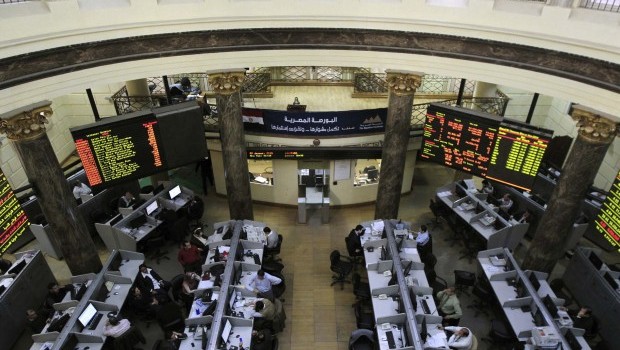
Traders work at the Egyptian Exchange in Cairo in this January 22, 2013 file photo.
(Reuters/Mohamed Abd El Ghany)
Cairo, Asharq Al-Awsat—The chairman of the Board of Directors of HC Securities and Investment, Hussein Choucri, has said that investors from the Gulf region are interested in venturing into the Egyptian market and are currently considering available opportunities.
Choucri, whose company handles assets worth over USD 700 million, told Asharq Al-Awsat that investors in the Gulf region are well aware of the political and economic developments in Egypt, and that “they see these problems as short term and that the value of opportunities should be looked at in three to five years time,” adding that “pharmaceuticals, banking and food were among the sectors attracting interest from investors to the Egyptian market.”
Choucri, whose company also works on mergers and acquisitions, said: “There is a list of acquisition projects in Egypt, Gulf markets and the Turkish market being researched by the company,” adding that “we have instructions for a number of very good projects, and we hope to conclude them all.”
HC Securities and Investment acted as one of the consultants for the Emirates National Bank of Dubai in the acquisition of BNP Paribas Egypt for USD 500 million, and the financial consultant for the Jordanian Al-Hikma Pharmaceuticala in its acquisition of the Egyptian Company for Pharmaceuticals for USD 22 million. He said the importance of these deals was the fact that they were completed during a time of uncertainty, which “some investors see as a stamp of approval.”
Banks and securities companies in Egypt have suffered greatly in recent years because of the political upheaval in the country. However, Choucri said: “In these difficult times, HC is a shining example. We have completed a number of deals recently and managed to launch a new monetary fund three weeks ago, which is our 15th. We have also kept our staff and met all our obligations, and all these seem satisfactory to me.“
The company has a headquarters in Dubai, of which Choucri says: “Our branch in Dubai is the regional center of our operations in the Gulf. We are not thinking of expanding at this time, and we are focussing our activities there on consultancies and investment banks only. We have no current plans to enter new markets in the region.”
HC entered the Gulf market in 2006 in partnership with Al-Futaym Group, working in both financial mediation and consultancy. The partnership ended in 2011 and HC has since focused on consultancy.
In 2005, the company attempted to enter the Saudi market. Choucri said: “We had long and varied discussions with parties in the Saudi market to form companies. We were interested in the financial consultancy sector, but we were not lucky. We will, however, remain open to any partnership offers from the Saudi market.”
The political situation in Egypt has caused the stock market performance to drop. Its main index lost 14 percent of its value, from the start of the year until the end of trading yesterday.
Choucri said the stock market performance is linked to political and economic stability, adding: “If things stay as they are, the stock market is not going to recover,” and that “imposing taxes on the stock market was a knock-out blow. . . . What the government did was impose taxes on a sector which was weak in resources, and this has harmed the economy.”
A number of companies have left the Egyptian stock market for foreign exchanges over the past year.
Choucri said: “Had the stock market been in good heath, these companies would have thought hard before leaving. Had the political and economic situation been stable, these companies would not have thought of joining foreign markets. When the government makes a decision, it must think: Will this decision drive away registered companies? Would it drive away investors?”
A new board was elected this week to run the Egyptian Exchange until 2017. It is also expected to have both the chairman of the stock market and the chairman of the financial services monitoring commission replaced.
“The new administration must be against any initiatives to impose new taxes, or reduce the size of investments in the stock market, and they should have a strong voice to impose their will on decision makers who affect the stock market, so no decisions are made without consulting them first,” he said.
Choucri said the budget deficit, which was expected to reach USD 31.4 billion by the end of the current year, was caused by “the misuse of the country’s resources, especially energy resources.” He also said the loan from the International Monetary Fund (IMF) of USD 4.8 billion was important and that Egypt had no alternative, adding that this loan would help attract foreign direct investment.
